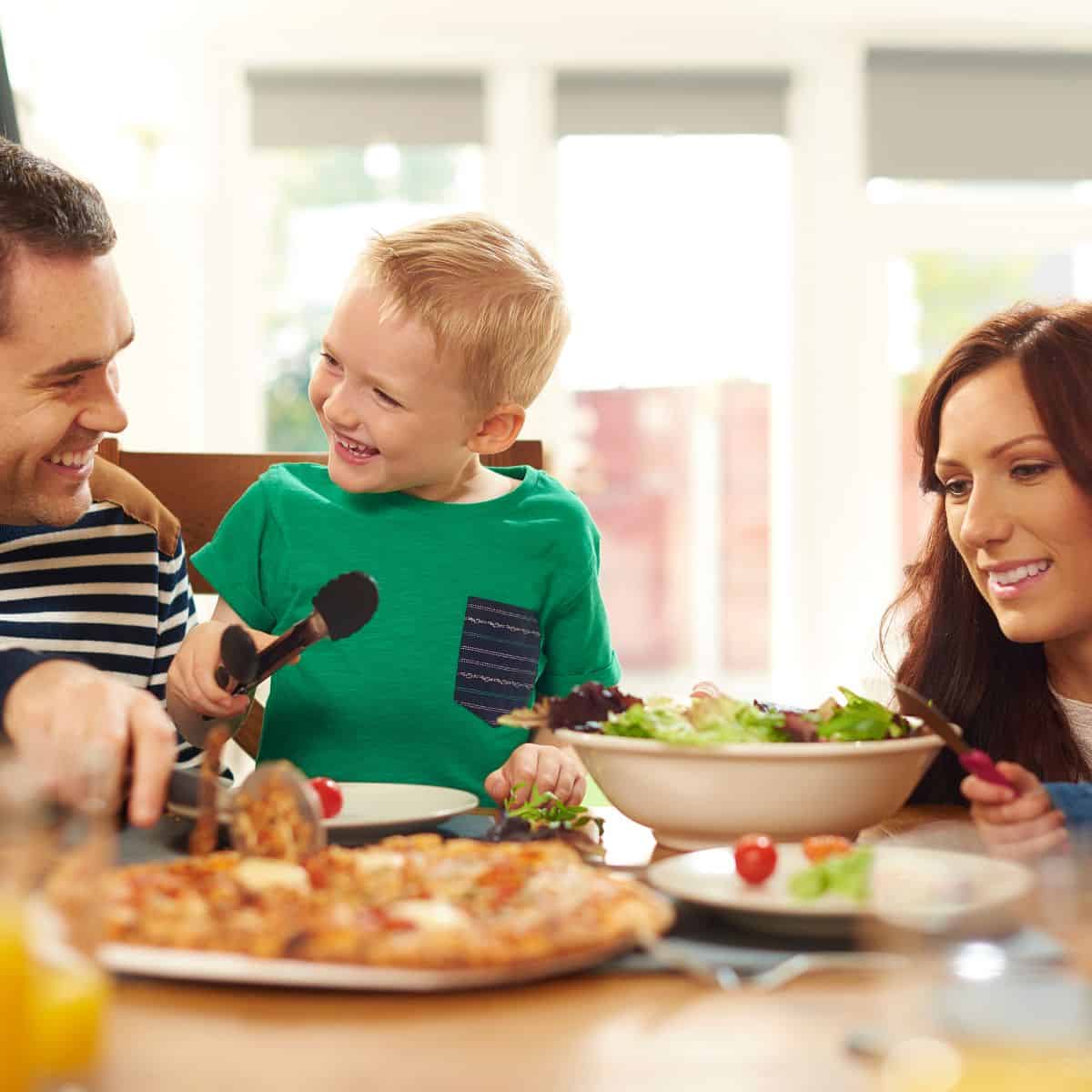Parental Disagreements: What To Do When You Have Different Parent Feeding Styles & Practices
Apr 26, 2023, Updated Apr 06, 2024
This post contains affiliate links. Please see our disclosure policy.
My husband and I don’t always agree on how to feed our kids. I’m sure that’s never happened to you and your partner…😉 But just, you know, in case it happens in the future, this post will help you navigate your different parental feeding styles and practices.
Table of Contents
- Meet Dr. Cassidey Freitas
- Why Feeding Your Kids Is So Triggering
- Common Disagreements About Parent Feeding Styles & Practices
- #1 One parent is more forceful or strict
- #2 You disagree on what your child should eat
- #3 Your approaches to picky eating are opposite
- #4 Your mealtime expectations don’t match
- Navigating Parenting Disagreements at Meal Time
- What To Do If You’re Partner Isn’t On Board
- It’s Not Just You Two! All Partners Fight.
- Is Picky Eating a Trigger for You and/or Your Partner?
Meet Dr. Cassidey Freitas
I wrote this post with the help of Dr. Cassidy Freitas, a licensed marriage and family therapist based out of California. She specializes in helping millennials navigate the early years of parenting as individuals, partners, and families. She also hosts the podcast Holding Space. If you haven’t listened yet, start as soon as you finish this blog post!
Related: If you prefer to listen, check out my Mama Knows Nutrition Podcast episode with Dr. Cassidy Freitas!
Why Feeding Your Kids Is So Triggering

For many of us, food was a complicated part of growing up. We have baggage from childhood, growing up, and our relationships with food, which we carry with us. And this makes feeding our kids complicated. You probably have your food influences in your head every day! They could feel like a constant voice in your ear. And whether it’s your mother, mother-in-law, father, yourself, or anyone else, it puts a lot of pressure on you.
And THEN you add in another parent with all their own baggage and history. And things can get messy fast. If your partner grew up differently than you did, or you’re the primary meal provider and they aren’t up to speed, on board, or supportive of your approach, it’s easy to feel like you’re on different sides. And this often boils over into some super common arguments.
Common Disagreements About Parent Feeding Styles & Practices

#1 One parent is more forceful or strict
Often, this sounds like the more forceful parent saying:
- “You have to eat 3 more bites!”
- “You have to clean your plate.”
- “Finish eating your chicken before you can have dessert!”
- “No playing with your food!”
- “Stay at the table until you finish those beans!”
High chance that the more strict partner grew up with parents who enforced the same rules!
Related: Get my step-by-step guide to help your toddler stay seated at the table longer!
#2 You disagree on what your child should eat
This can materialize as one parent offering packaged and convenience foods to their kids (and seeing no problem with that) when the other parent places a high value on fresh or home-cooked meals.
#3 Your approaches to picky eating are opposite
It’s super common for one partner to want to try a low-pressure approach while the other takes a more traditional stance, saying things like, “if you don’t make them try something new, they’ll never eat it!” or believing that the child shouldn’t leave the table until they’ve eaten what’s on their plate.
#4 Your mealtime expectations don’t match
If one parent or caregiver is very health-conscious or worries about weight gain and body size, they may want to restrict the child’s diet or put them on a specific diet. Which often sounds like:
- “Just one piece of pizza is all you can have!”
- “No dessert because you need to lose weight.”
This one is very tricky when the other parent disagrees and prefers to “let the child eat.”
Navigating Parenting Disagreements at Meal Time
These disagreements are so common—but that doesn’t make them easy to navigate. It’s always hard to fight with your partner, but mealtime fights aren’t a one-and-done thing and that can make them even trickier. Because if you don’t find a way through it, you’ll have the same argument for breakfast, lunch, and dinner. Every single day.
So let’s talk about how to start addressing this with your partner!

#1 Notice How You Feel
Maybe it’s the little body signals you receive when you’re feeding your child together. Maybe you feel tense with the way that your partner says something. Or maybe you find yourself triggered by a particular situation. Either way, start by noticing how you’re feeling. Because if you’re triggered or dysregulated, it’s important to talk about why. But also, now might not be the best time to get into it.
#2 Make A Plan To Talk
Following the noticing, approach your partner and say, “Hey, I think it’d be helpful for us to talk about mealtime and how we feed our child.” If you’re presenting this, take ownership of what you’ve been noticing.
- “I’ve been noticing that when things get messy, I get triggered and a little irritable.”
- “I catch myself saying these things that I don’t think are helpful but were things that I heard as a kid.”
- “I noticed that when I did this, it felt good!”
- “I’ve been learning X, and it’s been helping.”
This will allow you to talk about what you’re bringing to the table, literally and figuratively.
#3 Hear Each Other Out
Share your side with your partner, then listen to what they have to say about how they grew up and what they believe about food. There might be some things one or both of you realize you want to change.
Exploring your points of view and where they stem from will bring context to the disagreement. This way, if, in the future, your child wants a snack before dinner and one of you gets triggered by that, the other can pause and reflect on why it might be so hard. When you have more understanding and compassion for where your partner is coming from, you’re in a different place than you would be otherwise. Sometimes, this will mean that before letting that frustration or anger jump in the driver’s seat, you can calm down and offer a different perspective.
#4 Repair
Let’s be honest. Some days, you’ll still get mad at your partner because you’re human. Or you’ll forget that you want to encourage your child to listen to their body because you were a verified member of the Clean Plate Club growing up. It’s okay—because you can always repair!
You can repair with your partner if you don’t like how you acted or spoke to them in the moment. That might sound like:
“You know what I think I do sometimes? I think that when you say X, Y, or Z, it triggers this thing for me. And then I think I respond in these ways, and I want to try to shift that for us. Maybe we can have a bigger conversation about how we approach mealtime with our kids.”
You can also repair with your child if a mealtime parenting decision leaves you feeling like you wish you could have a redo. You might not have grown up with adults who were willing to apologize to you, so try to imagine what it would’ve felt like if an adult in your life came up to you and said:
“Hey, sometimes when we’re eating dinner, I think that I kind of assume you haven’t eaten enough and that you need more. But actually, the only person who knows what it feels like in your body is you. And so I think sometimes I say things like, I need you to eat two more bites before you can have a dessert. And I’m going to try to change that.”
Anytime you realize you’ve done something you “shouldn’t” have done, the way to move forward or change it is through repair. Tell them you realize you were doing it and it wasn’t the best thing, but you’ve learned something new and want to make changes. You can just come right out and say it and that’s okay!
Related: Get this free guide to help your child understand their internal hunger and fullness cues to help them regulate their eating!

#5 Get On The Same Page
If you keep having the same disagreement, talk about what you want your child’s relationship with food to look like. Somewhere in there, you’re going to find some common ground. You might have different ideas of how you get there, but if you can identify that you both want similar things for your kids, it can go a long way in helping you shift from being enemies to allies. And once we know the outcome you want, you’re in a better position to explore what will get you there.

What To Do If You’re Partner Isn’t On Board
If this approach is too direct or triggering for your partner, or you’re just not getting anywhere, that’s an important signal. If you keep getting caught up in a cycle of blame, criticism, defensiveness, withdrawal or stonewalling, you might need more support to work through it.
Don’t let this be a bad thing if you can, because you do not need to be on the brink of divorce to find couples therapy supportive! Look at it like going to your doctor to get a physical. You’re taking care of your relationship and giving it a little tune-up. It can be one of the most beautiful things we can do for our kids, too.
Therapy is a safe space where you can both begin to put down some of the defense mechanisms you’re holding and get to the root of things. And if your partner isn’t open to couples therapy, you can always go for individual therapy sessions until they’re ready.
It’s Not Just You Two! All Partners Fight.
Fights like these are normal and extremely common. With time and intention, they can be worked through and get better! Connect your conversations to your values and what matters most to your family. That’ll help you both think big-picture and stay in it, which is how you’ll get to the other side of the disagreement. You’ve got this!
Is Picky Eating a Trigger for You and/or Your Partner?
If picky eating is a trigger at your home, check out my Picky Eater Starter Guide for free tips to help your family ease the picky eating stress or check out my self-paced digital course to end picky eating and help your child enjoy a larger variety of food!














